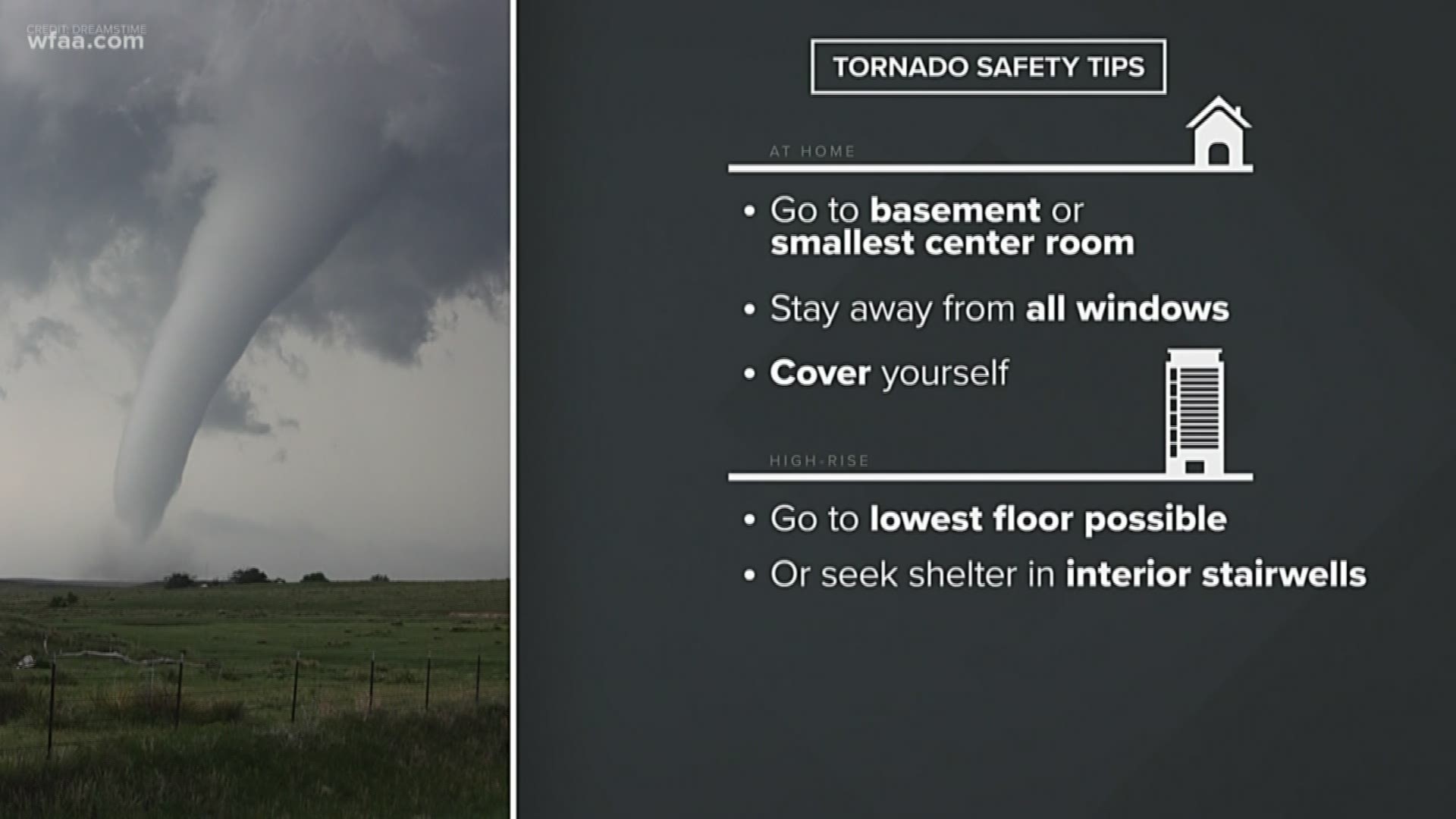DALLAS — This story was originally published in Jan. 2021, was updated in April 2022 and was updated again in November 2022 with current weather details.
A cold front entering the North Texas region from east to west will be bringing a chance of severe storms with it on Friday.
There are a number of things you can before storms arrive, as well as during and after any severe weather, to help make sure you're prepared for whatever Mother Nature may have in store.
What to do now
1. Make a plan. Talk with your family or coworkers about where you will go during extreme weather. Know the safest place in your home or office.
2. Prepare an emergency supply kit. The kit should have a number of items, including water (a gallon per person per day), non perishable food, a flashlight with extra batteries, prescriptions, first aid supplies, a charger and backup battery.
3. Charge your phone(s) and fill up your gas tank.
4. Put away any items in your yard or on your patio that could blow away.
5. Download the WFAA app and sign up for automated severe weather alerts so you know when to take cover.
6. Check your insurance policies. The Insurance Council of Texas (ICT) recommends you ensure your auto, homeowners or renters, flood and wind policies are active, as they can be essential for storm recovery.
RELATED: It's severe weather season in Texas — do you know where your homeowners insurance policy is?
On the road?
The National Weather Service in Fort Worth released the following tips if you find yourself on the road during a storm:
1. Never stop under bridges or overpass to protect yourself from hail.
2. Bridges give no protection from wind-driven hail.
3. Your parked car will block traffic and may cause several car accidents.
4. Seek shelter in a strong, sturdy building if possible.
5. Do not drive or walk through standing water.
What to know during a storm: Watch vs. Warning
A WATCH means a storm is being monitored.
Depending on the watch issued, a watch is posted when weather conditions are favorable for the development for either severe thunderstorms, tornadoes or flash flooding.
Tornado Watches and Severe Thunderstorm Watches are issued by the National Oceanic and Atmospheric Administration's Storm Predication Center in Norman, Oklahoma, and usually for a time period of several hours.
Flood Watches are issued by local National Weather Service offices, and for periods of time ranging from hours to days.
When a watch is issued for your area, it's important to come up with a plan of action. Where would you go if a warning is issued?
When a WARNING is issued, it's time to put your plan into action.
When a Tornado Warning is posted, it's either been spotted or detected on radar by meteorologists.
When a Severe Thunderstorm Warning has been issued, 1-inch size hail and/or 58 mph+ wind gusts have been reported or detected by radar.
A Flash Flood Warning is urgent. If one gets issued for your area, rapid rises of creeks, streams, and rivers are possible.
A Flood Warning is issued for a slow rise of a creek or river into "flood stage." Typical flood-prone areas or flood plains now have standing or flowing water.
If your area is under a Severe Thunderstorm Warning or Tornado Warning, it is time to take shelter in a lower-level, interior room away from windows.
When a Flash Flood Warning is issued and your area is flooding or prone to flooding, it's time to seek higher ground.
After the storm has passed
The first step is to ensure you are in a safe place, either stay where you are or leave the area, depending on your surroundings. Then communicate with your family and friends to let them know you are safe and your location.
If your home or car has suffered damage, contact your insurance agent as soon as possible.
Assess damages to your property carefully, ICT says. Especially pay attention for downed power lines, debris, or flooding. And document any damage you come across.
If possible, make immediate repairs that could mitigate damage and keep your receipts, according to the ICT.
Finally, if you do have to have repairs made to your house, watch out for potential fraud, particularly people who ask for money up front, promise quick fixes, or say they will take care of your deductible.
RELATED: How to avoid contractor fraud

